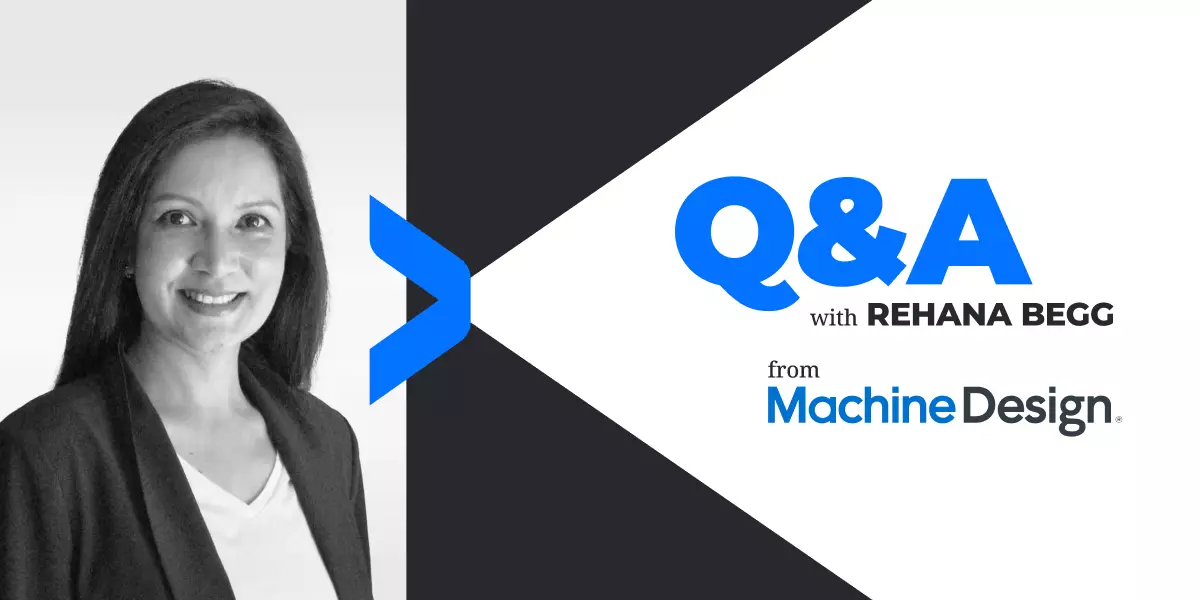Industry Insight: Q&A with Machine Design – Automation and Controls, AI, Challenges and Opportunities

Machine Design Head of Content/Editor-in-Chief Rehana Begg talks with us about the trends, challenges and opportunities within the industrial manufacturing industry.
The industrial manufacturing industry has undergone a series of rapid changes over the past few years, largely due to the growing skills gap and the exponential growth of AI, as well as the continued pursuit of sustainability goals and increased scrutiny of cybersecurity.
We asked Rehana Begg, Head of Content and Editor-in-Chief at Machine Design, about what she’s seeing in the industry.
How is AI being used to optimize processes or provide insights in the manufacturing space?
We are witnessing a revolutionary change where AI is deeply integrated in everything from ideation, design, engineering and prototyping through product launch, processing, fabrication, quality control and distribution. AI is multiple revisions away from replacing engineers. But we now have smarter, AI-powered CAD tools, for example, that anticipate design engineers’ next moves, generate alternatives to new manufacturing techniques in additive manufacturing and analyze historical data to offer maintenance improvements downstream.
AI is a strategic enabler that equips smart factories with real-time communication between machines and agile supply chain optimization. The trajectory is for overall smart, strategic decision-making across the manufacturing lifecycle.
We’ve been hearing about workforce transitions and skills gaps for many years. Is that still a relevant trend? As the digital transformation of the industry continues, how can the next generation of engineers stay ahead of the curve?
The skills gap is as relevant in 2025 as it was a decade ago. But as digital transformation accelerates, so does the demand for engineering talent skilled in the latest technology.
To keep pace, engineers need access to certifications and training in specialized, high-demand areas, such as automation skills driven by Industry 4.0 automation, AI and sustainable design and manufacturing. They must also be aware of growing opportunities in emerging sectors such as electrification and sustainability.
From the companies’ perspective, upskilling initiatives, cross-disciplinary experience and offering flexible work environments are effective retention strategies for retaining engineering talent.
What role are automation and controls engineers playing in helping manufacturers achieve sustainability and ESG goals?
Countless sources interviewed by Machine Design over the past couple of years have provided insight into how firms are prioritizing sustainability and ESG goals. Manufacturers are leveraging digital twins, smart automation and AI-driven simulation and benchmarking tools to optimize designs for environmental impact and carbon reduction throughout the lifecycle.
Continuous improvement is supported by integrating advanced controls into machinery, thereby refining clean production techniques through precision process controls and real-time monitoring. These roles are further supported by associations such as the ASME (American Society of Mechanical Engineers), which reports the demand for sustainability and engineering executives is on the rise and is actively expanding its climate strategy portfolio. ASME is aligned with the United Nations’ Sustainable Development Goals and is engaging the international workforce on ways to meet climate challenges.
How are industrial automation companies addressing cybersecurity risks, especially with the rise of connected devices and OT-IT convergence?
Industrial automation companies are well aware of the cybersecurity risks associated with increased connectivity. However, balancing security controls with operational stability in the industrial automation environment can be a challenge, as overly restrictive IT measures can delay critical operational processes.
Some firms are being proactive by minimizing attack surfaces, for example, by emphasizing physical and network segmentation. Others are mitigating emerging threats, such as ransomware attacks on industrial control systems, by installing network monitoring and layering defenses through encryption, authentication and intrusion-detection solutions tailored for OT environments.
What primary challenges and opportunities are you seeing in the industry that have not been mentioned?
Manufacturing companies face ongoing challenges with disconnected legacy systems that hinder integration. There is no one-size-fits-all solution for manufacturers with varying business objectives to address market vectors, but there are opportunities, and it could start with investigating how they might integrate hardware and software. We hear from many subject matter experts how advances in electromechanical components are forging new pathways for efficient and service-friendly machinery and how these humble mechanical components are evolving to be a critical enabler for building resilience.
What is one suggestion you would offer marketers looking to engage automation and controls engineers?
Instinctively, I’d say exactly what I tell my peers at EndeavorB2B: In an environment that is increasingly dependent on AI, your communication can have a butterfly effect. Be hypercritical about what you put out there. Draw on real-world stories and clean data to benefit future decision-makers. Be vigilant. Verify details as if lives depended on it.
Thank you, Rehana, for sharing your insight and expertise!
Sign Up for our Newsletter - Get agency updates, industry trends and valuable resources delivered directly to you.
Rehana Begg - Head of Content / Editor-in-Chief, Machine Design
As Machine Design’s content lead, Rehana Begg is tasked with elevating the voice of the design and multi-disciplinary engineer in the face of digital transformation and engineering innovation. Begg has more than 25 years of editorial experience and has spent the past decade in the trenches of industrial manufacturing, focusing on new technologies, manufacturing innovation and business. Her B2B career has taken her from corporate boardrooms to plant floors and underground mining stopes, covering everything from automation & IIoT, robotics and mechanical design to plant operations, maintenance, reliability and continuous improvement.
Begg holds an MBA, a Master of Journalism degree, and a BA (Hons.) in Political Science. She is committed to lifelong learning and feeds her passion for innovation in publishing, transparent science and clear communication by attending relevant conferences and workshops.




